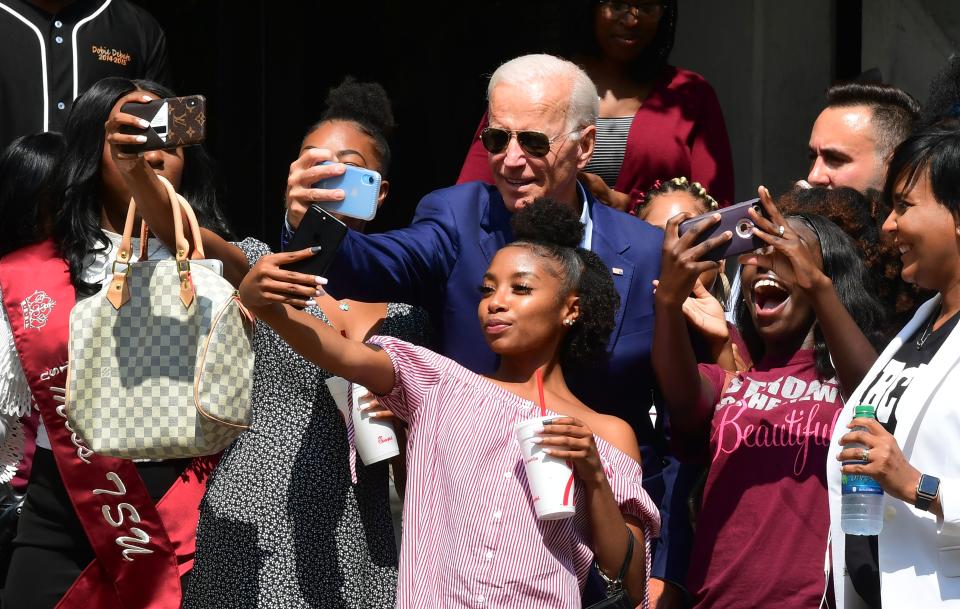2020 Vision Monday: How Biden could lose the black vote — and the Democratic nomination
Welcome to 2020 Vision, the Yahoo News column covering the presidential race with one smart, fast takeaway every weekday and a deeper roundup every weekend. Reminder: There are 140 days until the Iowa caucuses and 414 days until the 2020 election.
There are many reasons why Joe Biden has been leading the Democratic primary contest by double-digit margins for all of 2019.
But perhaps Biden’s biggest advantage — the factor that, more than any other, is helping him weather various controversies and gaffes — is his unsurpassed support from one of the party’s most important constituencies: black voters.
In recent days, the former vice president has both shown how strong that support currently is — and how it could potentially fade, upending the race.
According to the latest Politico/Morning Consult poll, a full 41 percent of black Democrats, who make up roughly a quarter of the primary electorate, back Biden for the nomination; the latest Washington Post/ABC poll put the number even higher, at 44 percent. Biden’s next closest competitor for the black vote (usually Bernie Sanders) tends to trail by 20 to 30 percentage points, and the former vice president is even further ahead in the heavily black early primary state of South Carolina. That’s a staggering advantage in a field as big and diverse as 2020’s.

Against that backdrop, Biden traveled Sunday to 16th Street Baptist Church in Birmingham, Ala., where he denounced institutional racism and the resurgence of white nationalism.
“There can be no realization of the American dream without grappling with the original sin of slavery,” Biden said from the pulpit, marking the 56th anniversary of the bombing that killed four young black girls there in 1963. “Those of us who are white try, but we can never fully, fully understand.”
According the New York Times, Biden received a “warm welcome,” with “little evidence that [his] advantage was sliding.”
“In nearly a dozen interviews,” the paper reported, “Mr. Biden was at the top of most people’s lists with many citing his partnership with [President Barack] Obama and describing genuine affection for Mr. Biden. No one said that his past remarks on race had changed their views.”
As for those past remarks, Biden has waxed nostalgic about his working relationships with segregationist senators and long touted the 1994 crime bill, which worsened mass incarceration, as one of his major achievements. But none of these “problematic” statements — and there are others — has dented Biden’s standing among black Democrats.
So what could?

Only once so far this cycle have black voters appeared to have second thoughts about Biden: in the wake of his confrontation with Kamala Harris over busing in the first round of Democratic debates in June.
After Harris caught Biden flat-footed on live TV, a Quinnipiac poll showed her surging into a virtual tie with the former vice president for first place overall.
Why? Because Biden’s support among black voters shrank to 31 percent (from 48 percent in the previous Quinnipiac poll), while Harris’s black support nearly tripled to 27 percent (from 11 percent previously).
Harris has since failed to consolidate that support, and she’s slipped back down to 6 percent nationally as a result.
But the fact that it happened once suggests it could happen again — and in last Thursday’s Democratic debate, Biden demonstrated how. Asked “What responsibility do you think that Americans need to take to repair the legacy of slavery in our country?,” Biden, without the benefit of the prepared text he brought the following Sunday in Birmingham, gave a rambling, nonsensical answer that referred to record players. Biden “seemed to suggest,” as columnist Charles Blow later put it, that “black people lack the natural capacity to be good parents” and must depend, as analyst Jeff Greenfield added, “on an army of white people with degrees to help them raise their kids.”
“We bring social workers into homes and parents to help them deal with how to raise their children,” Biden said. “It’s not that they don’t want to help. They don’t — they don’t know quite what to do.”
Unsurprisingly, Twitter had a field day with Biden’s remark. “A textbook example of the racism that is still respectable,” wrote Anand Giridharadas, an editor at large at Time magazine.
But none of Biden’s rivals took advantage.
Next time, he might not be so lucky. Biden’s popularity with black voters is built not just on familiarity or on his partnership with Barack Obama. It’s built on the perception that he is best equipped to win — a perception informed by the pragmatism of a vulnerable community that fears four more years of President Trump.
Back in June, Harris shook that perception by making Biden look retro and unsteady. She immediately shot up in the polls.
If and when someone does that again — whether it’s Harris in a debate, or Cory Booker or Elizabeth Warren winning Iowa — it’s not hard to imagine many of Biden’s black supporters defecting. Remember: In October 2007, Hillary Clinton was trouncing Obama by 24 percentage points among black Democrats. By January 2008, the same voters were backing the Illinois senator over Clinton by 28 points.
“African-American Democrats used to be reluctant to support Obama because they didn’t think a black man could be elected,” said CNN analyst Bill Schneider at the time. “Then Obama won Iowa and nearly won New Hampshire. Now they believe.”
In other words, if Biden’s rivals want to change black voters’ minds in the months ahead, they need to do more than just knock him off his stride. They have to give black Democrats an alternative — someone else to believe in.

Download the Yahoo News app to customize your experience.
Read more from Yahoo News:





